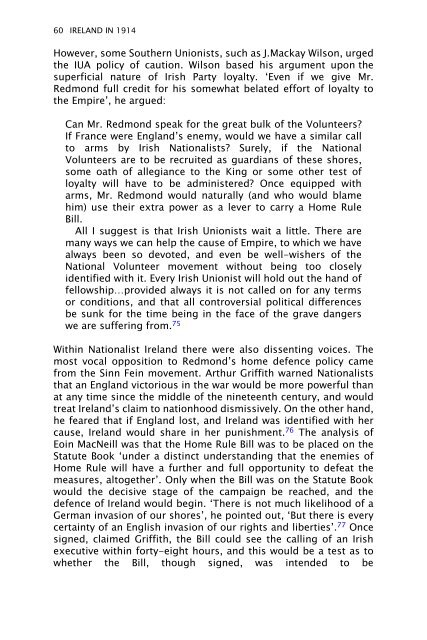Dividing Ireland: World War I and Partition
Dividing Ireland: World War I and Partition
Dividing Ireland: World War I and Partition
You also want an ePaper? Increase the reach of your titles
YUMPU automatically turns print PDFs into web optimized ePapers that Google loves.
60 IRELAND IN 1914<br />
However, some Southern Unionists, such as J.Mackay Wilson, urged<br />
the IUA policy of caution. Wilson based his argument upon the<br />
superficial nature of Irish Party loyalty. ‘Even if we give Mr.<br />
Redmond full credit for his somewhat belated effort of loyalty to<br />
the Empire’, he argued:<br />
Can Mr. Redmond speak for the great bulk of the Volunteers?<br />
If France were Engl<strong>and</strong>’s enemy, would we have a similar call<br />
to arms by Irish Nationalists? Surely, if the National<br />
Volunteers are to be recruited as guardians of these shores,<br />
some oath of allegiance to the King or some other test of<br />
loyalty will have to be administered? Once equipped with<br />
arms, Mr. Redmond would naturally (<strong>and</strong> who would blame<br />
him) use their extra power as a lever to carry a Home Rule<br />
Bill.<br />
All I suggest is that Irish Unionists wait a little. There are<br />
many ways we can help the cause of Empire, to which we have<br />
always been so devoted, <strong>and</strong> even be well-wishers of the<br />
National Volunteer movement without being too closely<br />
identified with it. Every Irish Unionist will hold out the h<strong>and</strong> of<br />
fellowship…provided always it is not called on for any terms<br />
or conditions, <strong>and</strong> that all controversial political differences<br />
be sunk for the time being in the face of the grave dangers<br />
we are suffering from. 75<br />
Within Nationalist <strong>Irel<strong>and</strong></strong> there were also dissenting voices. The<br />
most vocal opposition to Redmond’s home defence policy came<br />
from the Sinn Fein movement. Arthur Griffith warned Nationalists<br />
that an Engl<strong>and</strong> victorious in the war would be more powerful than<br />
at any time since the middle of the nineteenth century, <strong>and</strong> would<br />
treat <strong>Irel<strong>and</strong></strong>’s claim to nationhood dismissively. On the other h<strong>and</strong>,<br />
he feared that if Engl<strong>and</strong> lost, <strong>and</strong> <strong>Irel<strong>and</strong></strong> was identified with her<br />
cause, <strong>Irel<strong>and</strong></strong> would share in her punishment. 76 The analysis of<br />
Eoin MacNeill was that the Home Rule Bill was to be placed on the<br />
Statute Book ‘under a distinct underst<strong>and</strong>ing that the enemies of<br />
Home Rule will have a further <strong>and</strong> full opportunity to defeat the<br />
measures, altogether’. Only when the Bill was on the Statute Book<br />
would the decisive stage of the campaign be reached, <strong>and</strong> the<br />
defence of <strong>Irel<strong>and</strong></strong> would begin. ‘There is not much likelihood of a<br />
German invasion of our shores’, he pointed out, ‘But there is every<br />
certainty of an English invasion of our rights <strong>and</strong> liberties’. 77 Once<br />
signed, claimed Griffith, the Bill could see the calling of an Irish<br />
executive within forty-eight hours, <strong>and</strong> this would be a test as to<br />
whether the Bill, though signed, was intended to be








